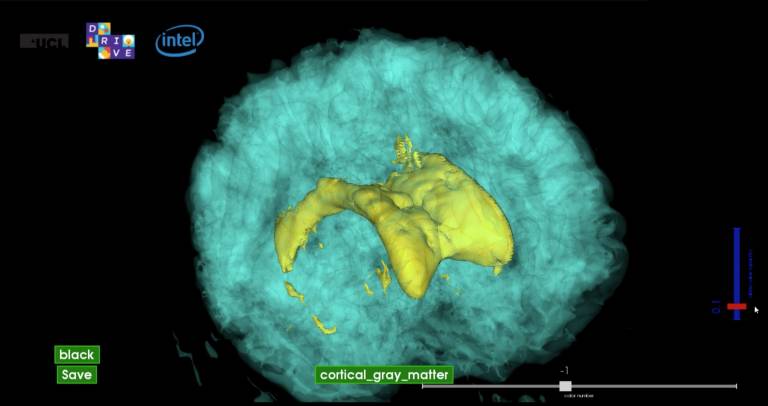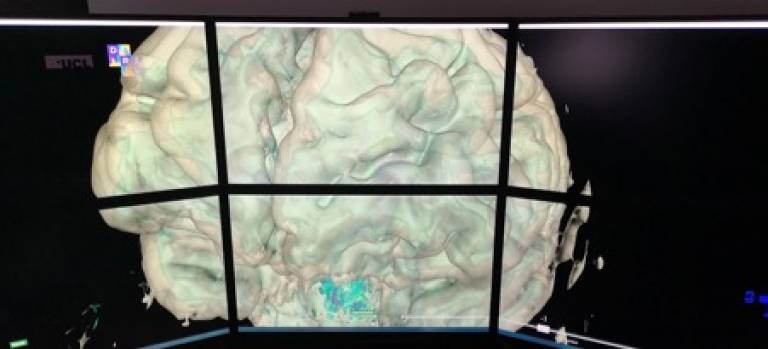UCL and GOSH HoloRepository 2020 PoC with support from Intel UK
20 May 2020
UCL Computer Science collaboration leads to HoloRepository 2020 Proof of Concept - an open source FHIR enabled research demonstrator project

The HoloRepository 2020 Proof of Concept is an open source FHIR enabled research demonstrator project. It enables example CT and MRI DICOM scans of the brain, lungs, chest, abdomen and kidneys to be rendered as a 3D view using a pre-trained model and the latest techniques for organ segmentation. It features surface smoothing and transparency information on organ segments stored as holographic GLB files. Using openly available imaging data in place of patient data, this software has been developed in partnership by UCL Computer Science and The Digital Research, Innovation and Virtual Environment Unit (DRIVE) at Great Ormond Street Hospital for Children NHS Foundation Trust (GOSH) with support from Intel(™) Health and Life Sciences.
HoloPipelines and HoloRegistration are component parts of HoloRepository 2020. HoloPipelines has an Intel(™) optimised core which enables improved 3D mesh generation for the segmentation of organs. These optimisations were added using a combination of Intel Distribution for python and Numba. Performance was profiled in detail using Intel V-Tune, which gave in depth analysis of processor usage and memory bandwidth. HoloRegistration enables simplified over-the-body tracking of the holographic views, achieving an Augmented Reality clinical education experience.
It has three major editions:
1. HoloRepository 2020 Viewer works on your laptop/PC as a 3D viewer rendering images straight from CT/MRI DICOM scan files locally, with its HoloPipelines segmentation component. This is intended for clinicians to present and teach with.
2. HoloRepository 2020 for NUCs is an optimised build for clinical Intel(™) NUCs that can show 3D views and simulate a local FHIR enabled database for researchers looking to explore experimental results. This is intended for clinical research settings and can make use of multi screen displays.
3. HoloRepository 2020 for Azure and HoloLens 2 is an Azure Cloud solution that works with the newly released HoloLens 2 and facilitates cloud storage of 3D models.
HoloRepository 2020 features Fast Healthcare Interoperability Resources (FHIR interoperability) standards in the second and third edition. The organ segmentation also utilises the latest open source Machine Learning (ML) algorithms in the field (ML Grand Challenges in Biomedical Image Analysis) with a supporting structure for future ML algorithm revisions. With this, a model training process is planned that will allow hospitals and clinical groups to build out organ segmentation models on their own DICOM sets.

Congratulations to the authors of this year's edition: Abhinath Kumar (cloud and NUC architect), Immanuel Baskaran (graphics and Intel optimisations), Carlo Winkelhake (machine learning) and Daren Alfred (augmented reality), who are all final year students at the Department of Computer Science, UCL on the UCL Industry Exchange Network programme (UCL IXN). They were supervised by: Dr Dean Mohamedally (UCL), Prof Neil Sebire (GOSH DRIVE), Sheena Visram (UCL) with clinical advice from Dr. Owen Arthurs (GOSH).
“GOSH DRIVE has been delighted to work with this excellent team of UCL computer science students on HoloRepository 2020, who have done amazing work. The potential applications for holographic representation of medical information is only just beginning, and HoloRepository 2020 can act as a catalyst and platform for how this develops.”
Professor Neil Sebire, Director of GOSH DRIVE
Extending thanks to the team at Intel UK, comprising Costas Stylianou, Philippa Chick, Chris Feltham along with Jo Baker from Astra Zeneca for assisting and mentoring the UCL Industry Exchange Network students throughout the academic year.
“Intel UK is delighted to have supported the UCL students on their ambitious project to enhance the patient experience through AI. The promise of AI in healthcare is profound, and the students have shown how the combination of imagination with the right hardware and software can make that promise a reality. Intel® NUCs featuring Intel Core™ Processors are an ideal platform for AI and Intelligence at the Edge, and software tools like Intel® VTune™ Profiler and OpenVINO™ can help extract maximum performance – the students used these technologies to great effect.”
HoloRepository 2020 is available from Apperta Foundation's open source repository which supports the NHS as part of the IXN for the NHS.
Further links:
https://abhinathk.github.io/HoloRepository-Website/#/home
 Close
Close

